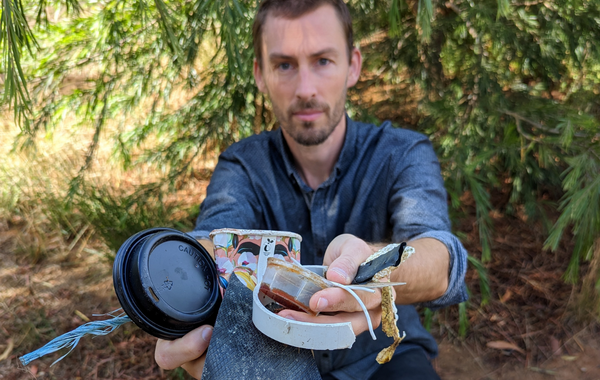Do microplastics affect our health?

You don't have to spend much time walking along any nature strip and you'll find plastics which will eventually breakdown into microplastics. Photo: GEELONG SUSTAINABILITY
Plastic pollution is becoming a growing problem for the environment, but could microplastics be worse?
Microplastics are plastic waste that have reached the environment and broken down into small pieces of five centimeters or less.
According to experts they are polluting global food and water systems, and our health.
Geelong Sustainability CEO Dan Cowdell said microplastics can be invisible to the naked eye.
“Plastic doesn’t break down like other organic products and just disappear,” Cowdell said.
“It stays in the environment for hundreds and hundreds of years and turns into this terrible problem we have with microplastics.”
According to a 2019 study by University of Newcastle, Australia, commissioned by the World Wide Fund for Nature (WWF). people ingest approximately five grams of plastic every week on average — the equivalent weight to an entire credit card.
“I think that shocked me the most… was that already microplastics are in our food system, they’re in our drinking water, they’re in our salt.”
According to the study, that is roughly 21 grams a month, or over 250 grams a year.
“There has been a lot of research over the last year or two showing that microplastics actually cause damage to the human cells.”
Research published in the Journal of Hazardous Materials, led by Evangelos Danopoulos, of Hull York Medical School, UK, found ingesting microplastics can be linked to cell death, allergic response, and damage to cell walls.
According to the 2019 WWF study, water, both bottled and tap, is the single largest source of plastic ingestion worldwide.
Of consumables, shellfish, beer, and salt recorded the highest levels of plastic, with the report concluding the problem of plastic pollution is directly affecting people through leakage of plastic into the environment and food chains.

In 2017, a citizen science project led by Sustainability Victoria in partnership with EPA Victoria and Melbourne Water called ‘Microplastics and Port Phillip Bay’ investigated the presence of microplastics on Port Phillip Bay beaches.
The study found Microfibre fragments — which are microplastics visible only under microscope — were present on most Port Phillip Bay beaches and were found in greater proportions than visible microplastics.
“They’re doing harm to wildlife, fish and birds, and there is a big problem with port Phillip Bay with microplastics in our bay and on our beaches and in our wetlands.
“We recently had some clean up Australia events and clearly you don’t have to spend much time walking along any nature strip and you’ll find microplastics, but it’s also the minute sized micro particles that you can’t even see that are becoming a problem and that’s what a lot of the research is starting to point to, where it is getting into our bodies and causing problems.
“We’re seeing microplastics in wetlands, really ruining that natural pristine environment, and of course the flow on effect that has with the wildlife and the terrible thing is they’re just there for hundreds and hundreds of years.”
Cowdell said reducing our intake of microplastics begins with thinking beyond normal recycling practices.
“We’d love to see the community reduce their use of single use plastic as much as possible… rethink, refuse, reduce, repair, reuse.
“There’s a lot of really practical things we can do, and we’ve got a guide on our website about how people can reduce waste.
“It really starts with the choices we make when we go to purchase something, as much as possible
when we go to purchase, goods, food, clothing, that it doesn’t come pre-packaged.
“Certainly, minimising waste in our personal lives, trying to use reusables where we can, taking the coffee cup to the coffee shop rather than getting takeaway and throwing it in the bin.”
For a guide on how to reduce microplastics in our local environment head to Geelong sustainability’s website www.geelongsustainability.org.au/zero-waste/

















